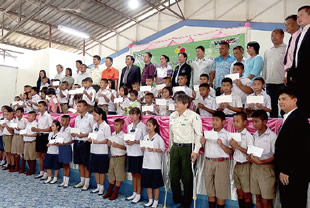In January 2018, the Eastern Seaboard Environmental Complex (hereinafter referred to as ESBEC) of the DOWA Group awarded scholarships at the Ban Khao Hin Elementary School in Thailand.
ESBEC, located in Si Racha, Chonburi Province, is a business that does recycling and landfill of waste oil, waste liquid treatment and waste.
The ceremony was held in a pleasant atmosphere, with many guests in attendance, including the mayor of Si Racha and the head of the district.
Scholarships were awarded to 60 children attending six schools in the area, and the money was used for teaching and writing materials.
For the children who received the scholarships, priority was placed on their economic situation with the purpose of giving them opportunities to learn, and they were chosen by the principals of each school.
In addition to the scholarships, ESBEC holds mangrove tree planting events and organizes excursions to natural parks. To promote recycling at the schools, they donate bins to separate garbage, and hold factory tours. They also support the teacher training fund, among other things. Every year, they continue to support the local schools in various ways.

interviewWe interviewed the principal of the Ban Khao Hin Elementary School to get their opinions and requests about the current situation of the school and the support they have received until now.
What are the issues at the school?
The first thing is the poverty of the children’s families.
Since Si Racha is an industrial park, it is an area where there are many migrant workers.
Many of the children's parents are immigrants from the north and south of Thailand, and the burden of living expenses such as house rent is heavy, so there are only a few children who can go to university.
In addition, while the number of teachers is determined according to the number of children, in fact, it is a problem that the number of teachers is small at every school.
In addition to the subjects of study, I have to take charge of classes for such special subjects as physical education and music, and I have hardly any time to prepare for the classes.
I think it is also important to increase the number of teachers.
Please tell us about your goals and the activities that you are putting effort into.
We are pursuing various initiatives aimed at becoming an eco-school.
We are doing pesticide-free agriculture such as vegetables, bananas and lemons, and making compost with fallen leaves that we have gathered. We also have the children themselves grow mushrooms and cultivate prawns.
We use the things that we produce in school meals.
In addition, the children learned how to make traditional houses, and painted the walls of red clay.
Such activities will help children improve their basic living skills.
In environmental classes, we also plant trees. The children select their favorite trees and we teach them how to care for them.
By teaching elementary school students on separating garbage, I think that recycling will become more of a reality in Thailand in the future.
Eventually, we expect our school to become a regional model and develop initiatives for neighboring elementary schools.
What is your thinking about relationships with companies and about our company?
Currently schools need to seek support and cooperation not only from the government, but also from local communities and companies, including economic support.
Of the two, the support from companies is very helpful.
There is a community representative at ESBEC, and they respond quickly.
I think that they are doing an appropriate business in waste treatment in Thailand
I would like you to keep developing together with the region in the future.

ESBEC actively participates in the community in various ways and strives to provide support themselves that is suitable for the characteristics and demands of the area.
For that reason, from day to day the community representative visits nearby districts and schools, so that they have many opportunities for dialogue.
Through such activities, it feels like the understanding towards ESBEC in the region is deepening.
We will continue to develop with local communities in the future through good communication.


